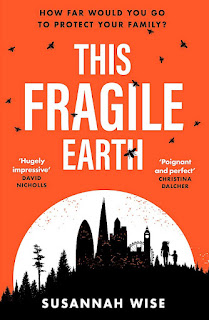This Fragile Earth - Susannah Wise
More technology clearly isn't the solution to our problems in This Fragile Earth - at least not in a way we might expect. After beetles were introduced to eat the chemicals that were on crops, the beetles became a problem and a disease called Bovine Staph infected the water supplier, so technological solutions have been introduced in an attempt to correct the ecological balance of the world. Aside from pollen-drones, many other bot and drone technology is now used for most everyday purposes; even policing is done by drone bots. What happens however when we are heavily reliant on those systems and they fail or get taken over by a hostile agency?
That seems to be the situation we find ourselves in from the outset of This Fragile Earth; cars stop working, financial transactions can't be carried out, communication devices fail, and we no longer have analogue systems in place to fall back on. Very quickly society begins to panic and people react in violent ways. Signy, her husband Matthew and their son Jed try to work out what might have gone wrong with the advanced coding of the TrincXcode constellation self-learning AI systems that control almost everything. It's a unique language, that Signy can only related to as akin to musical notation and harmony. Of more immediate concern however is conserving supplies and making a plan to survive. Matthew is left behind, and Signy and Jed make their way north through a London that is rapidly falling into disorder.
And essentially, there is not a great deal more to the majority of the book than this. We follow Signy and Jed's progress, as they eat food, pee, try to get through the next roadblock and avoid other people and menacing police drones. Jed continually wants to know were Dada is, Signy wonders constantly about her childhood friend Gethin. This becomes the repeated process for the next couple of hundred pages. It's not quite as clueless about what to do in an unexpected end to society as the main figure in Bethany Clift's Last One at the Party, but it has the same limited idea of heading north with nothing more than hoping for the best.
What is particularly limiting is that any dialogue or attempt to deal with the wider situation is played out in almost baby talk language between a mother and her child as she tries to keep Jed calm and hide him from the potential horrors ahead. There's a sense of protectiveness of Jed that tries to keep the lid on things, while underneath panic is setting in, but it's tedious banal motherly admonition and deflection while dealing with the practicalities of safe and healthy ways of living. It's largely skip-overable without missing anything important.
There are however underlying elements that in a way present the situation in unspoken terms and - significantly - in musical language and mathematical terms. Signy's constant thinking of Gethin, believing she even sees him, is also a way of wanting someone to explain everything and put things right, while the man in the NYPD cap personifies her fears. It taps into the underlying emotions and fears well this way, but in terms of developing a plot or idea, it falls very short elsewhere. For the larger part this is nothing more than moment to moment coping, reducing things to basics, eating, sleeping, keeping warm, finding shelter and avoiding hazards.
What might keep you interested is working out what has been the underlying source of the collapse of technology and society. Is it a takeover by a hostile foreign power or as has the self-learning AI gone rogue? A couple of late exchanges seem to sum up the general idea behind This Fragile Earth:
"As a species, we're just... Sometimes I think the world would be better off without us", to which the rejoinder is "You don't have a kid". "A system could not teach a person how to love" also highlights the limits of technology as a solution, even a self-learning Artificial Intelligence.
What is proposed isn't exactly new as far as SF is concerned, but Susannah Wise does adjust her sights towards the ecological realities of the direction we may be heading towards. Placing the perspective for this view largely on a mother and small child trying to survive however (despite the relevance of a mother being of primary importance) is however a very tedious and uninteresting way to approach the subject.
Reading notes: This Fragile Earth by Susannah Wise was published in hardback by Victor Gollancz in 2021 and is out in paperback in April 2022. Reviewed from an uncorrected proof supplied by the publisher.




Comments
Post a Comment